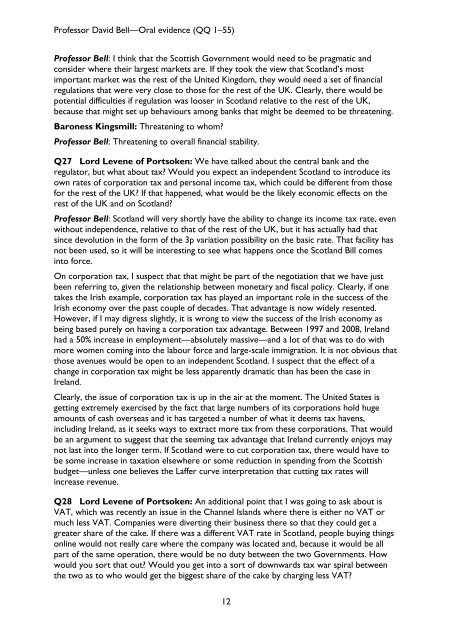SELECT COMMITTEE ON ECONOMIC AFFAIRS - Parliament
SELECT COMMITTEE ON ECONOMIC AFFAIRS - Parliament
SELECT COMMITTEE ON ECONOMIC AFFAIRS - Parliament
You also want an ePaper? Increase the reach of your titles
YUMPU automatically turns print PDFs into web optimized ePapers that Google loves.
Professor David Bell—Oral evidence (QQ 1–55)<br />
Professor Bell: I think that the Scottish Government would need to be pragmatic and<br />
consider where their largest markets are. If they took the view that Scotland’s most<br />
important market was the rest of the United Kingdom, they would need a set of financial<br />
regulations that were very close to those for the rest of the UK. Clearly, there would be<br />
potential difficulties if regulation was looser in Scotland relative to the rest of the UK,<br />
because that might set up behaviours among banks that might be deemed to be threatening.<br />
Baroness Kingsmill: Threatening to whom?<br />
Professor Bell: Threatening to overall financial stability.<br />
Q27 Lord Levene of Portsoken: We have talked about the central bank and the<br />
regulator, but what about tax? Would you expect an independent Scotland to introduce its<br />
own rates of corporation tax and personal income tax, which could be different from those<br />
for the rest of the UK? If that happened, what would be the likely economic effects on the<br />
rest of the UK and on Scotland?<br />
Professor Bell: Scotland will very shortly have the ability to change its income tax rate, even<br />
without independence, relative to that of the rest of the UK, but it has actually had that<br />
since devolution in the form of the 3p variation possibility on the basic rate. That facility has<br />
not been used, so it will be interesting to see what happens once the Scotland Bill comes<br />
into force.<br />
On corporation tax, I suspect that that might be part of the negotiation that we have just<br />
been referring to, given the relationship between monetary and fiscal policy. Clearly, if one<br />
takes the Irish example, corporation tax has played an important role in the success of the<br />
Irish economy over the past couple of decades. That advantage is now widely resented.<br />
However, if I may digress slightly, it is wrong to view the success of the Irish economy as<br />
being based purely on having a corporation tax advantage. Between 1997 and 2008, Ireland<br />
had a 50% increase in employment—absolutely massive—and a lot of that was to do with<br />
more women coming into the labour force and large-scale immigration. It is not obvious that<br />
those avenues would be open to an independent Scotland. I suspect that the effect of a<br />
change in corporation tax might be less apparently dramatic than has been the case in<br />
Ireland.<br />
Clearly, the issue of corporation tax is up in the air at the moment. The United States is<br />
getting extremely exercised by the fact that large numbers of its corporations hold huge<br />
amounts of cash overseas and it has targeted a number of what it deems tax havens,<br />
including Ireland, as it seeks ways to extract more tax from these corporations. That would<br />
be an argument to suggest that the seeming tax advantage that Ireland currently enjoys may<br />
not last into the longer term. If Scotland were to cut corporation tax, there would have to<br />
be some increase in taxation elsewhere or some reduction in spending from the Scottish<br />
budget—unless one believes the Laffer curve interpretation that cutting tax rates will<br />
increase revenue.<br />
Q28 Lord Levene of Portsoken: An additional point that I was going to ask about is<br />
VAT, which was recently an issue in the Channel Islands where there is either no VAT or<br />
much less VAT. Companies were diverting their business there so that they could get a<br />
greater share of the cake. If there was a different VAT rate in Scotland, people buying things<br />
online would not really care where the company was located and, because it would be all<br />
part of the same operation, there would be no duty between the two Governments. How<br />
would you sort that out? Would you get into a sort of downwards tax war spiral between<br />
the two as to who would get the biggest share of the cake by charging less VAT?<br />
12

















